- Download Price:
- Free
- Size:
- 0.04 MB
- Operating Systems:
- Directory:
- F
- Downloads:
- 626 times.
What is Filterfade.dll? What Does It Do?
The Filterfade.dll library is 0.04 MB. The download links are current and no negative feedback has been received by users. It has been downloaded 626 times since release.
Table of Contents
- What is Filterfade.dll? What Does It Do?
- Operating Systems Compatible with the Filterfade.dll Library
- Guide to Download Filterfade.dll
- How to Fix Filterfade.dll Errors?
- Method 1: Fixing the DLL Error by Copying the Filterfade.dll Library to the Windows System Directory
- Method 2: Copying The Filterfade.dll Library Into The Program Installation Directory
- Method 3: Doing a Clean Install of the program That Is Giving the Filterfade.dll Error
- Method 4: Fixing the Filterfade.dll Error Using the Windows System File Checker
- Method 5: Fixing the Filterfade.dll Error by Updating Windows
- Common Filterfade.dll Errors
- Dynamic Link Libraries Similar to Filterfade.dll
Operating Systems Compatible with the Filterfade.dll Library
Guide to Download Filterfade.dll
- First, click the "Download" button with the green background (The button marked in the picture).
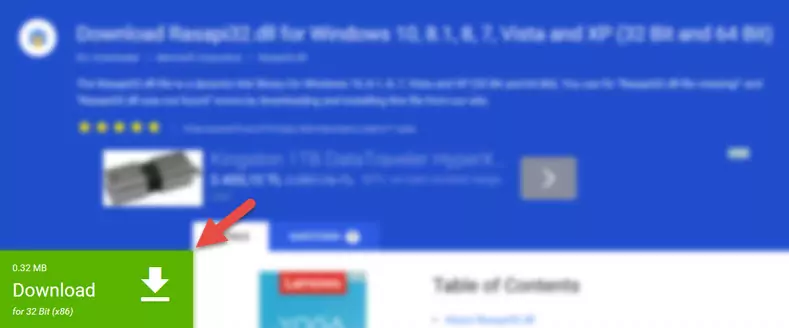
Step 1:Download the Filterfade.dll library - When you click the "Download" button, the "Downloading" window will open. Don't close this window until the download process begins. The download process will begin in a few seconds based on your Internet speed and computer.
How to Fix Filterfade.dll Errors?
ATTENTION! In order to install the Filterfade.dll library, you must first download it. If you haven't downloaded it, before continuing on with the installation, download the library. If you don't know how to download it, all you need to do is look at the dll download guide found on the top line.
Method 1: Fixing the DLL Error by Copying the Filterfade.dll Library to the Windows System Directory
- The file you downloaded is a compressed file with the ".zip" extension. In order to install it, first, double-click the ".zip" file and open the file. You will see the library named "Filterfade.dll" in the window that opens up. This is the library you need to install. Drag this library to the desktop with your mouse's left button.
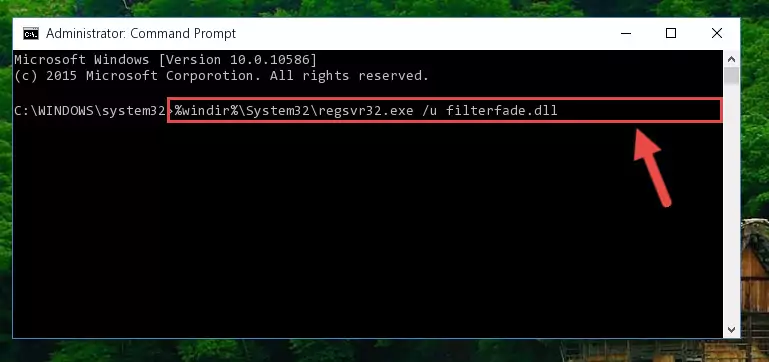
Step 1:Extracting the Filterfade.dll library - Copy the "Filterfade.dll" library you extracted and paste it into the "C:\Windows\System32" directory.
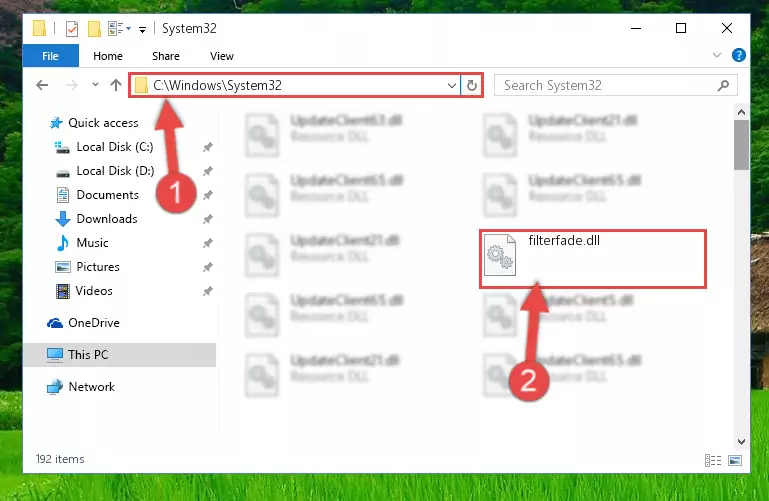
Step 2:Copying the Filterfade.dll library into the Windows/System32 directory - If your system is 64 Bit, copy the "Filterfade.dll" library and paste it into "C:\Windows\sysWOW64" directory.
NOTE! On 64 Bit systems, you must copy the dynamic link library to both the "sysWOW64" and "System32" directories. In other words, both directories need the "Filterfade.dll" library.
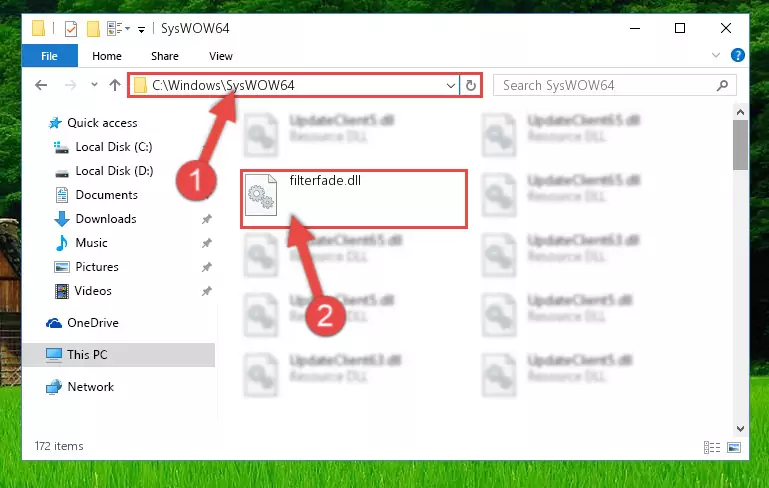
Step 3:Copying the Filterfade.dll library to the Windows/sysWOW64 directory - First, we must run the Windows Command Prompt as an administrator.
NOTE! We ran the Command Prompt on Windows 10. If you are using Windows 8.1, Windows 8, Windows 7, Windows Vista or Windows XP, you can use the same methods to run the Command Prompt as an administrator.
- Open the Start Menu and type in "cmd", but don't press Enter. Doing this, you will have run a search of your computer through the Start Menu. In other words, typing in "cmd" we did a search for the Command Prompt.
- When you see the "Command Prompt" option among the search results, push the "CTRL" + "SHIFT" + "ENTER " keys on your keyboard.
- A verification window will pop up asking, "Do you want to run the Command Prompt as with administrative permission?" Approve this action by saying, "Yes".
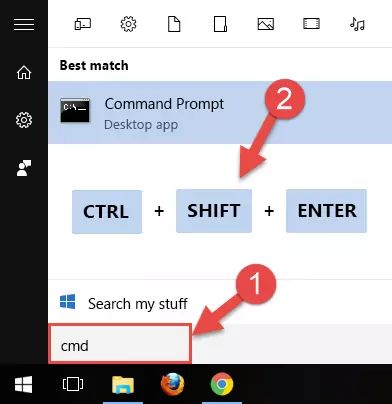
%windir%\System32\regsvr32.exe /u Filterfade.dll
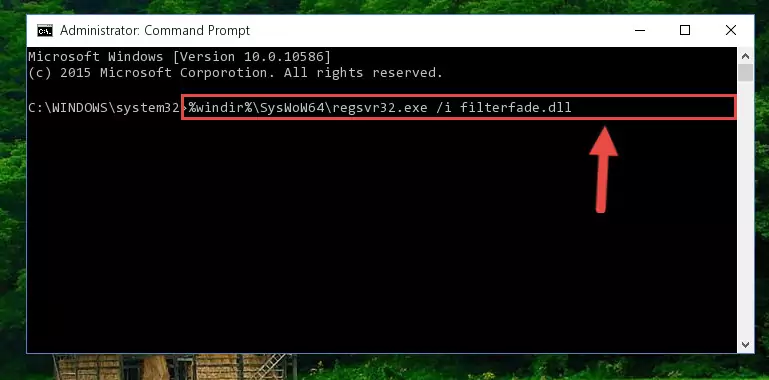
%windir%\SysWoW64\regsvr32.exe /u Filterfade.dll
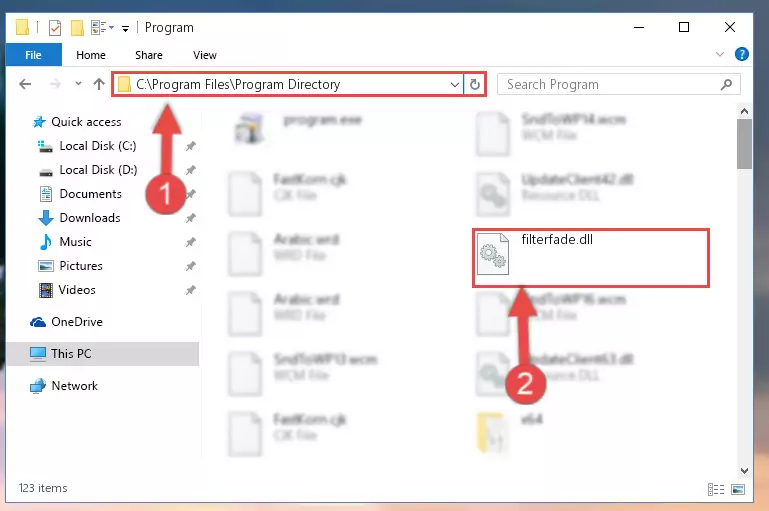
%windir%\System32\regsvr32.exe /i Filterfade.dll
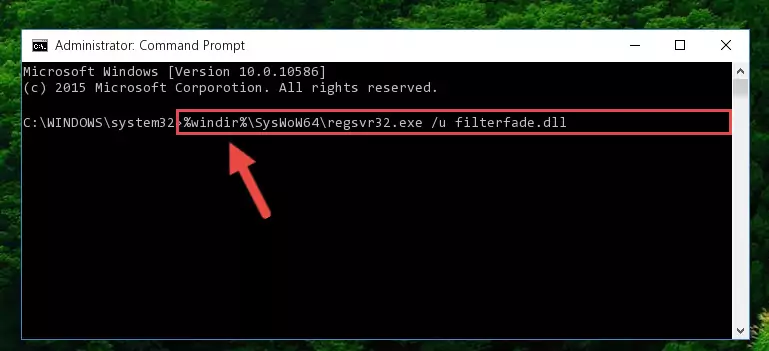
%windir%\SysWoW64\regsvr32.exe /i Filterfade.dll
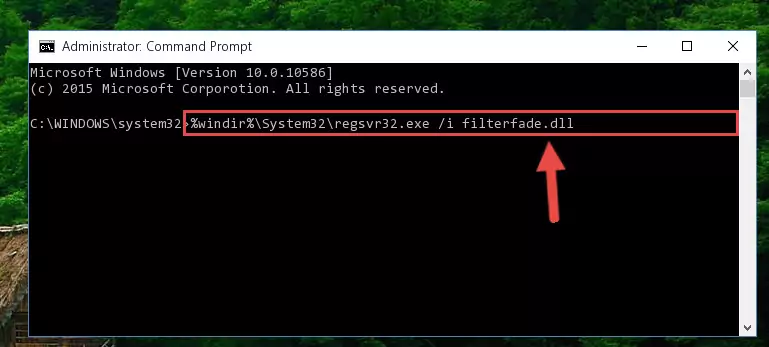
Method 2: Copying The Filterfade.dll Library Into The Program Installation Directory
- First, you must find the installation directory of the program (the program giving the dll error) you are going to install the dynamic link library to. In order to find this directory, "Right-Click > Properties" on the program's shortcut.
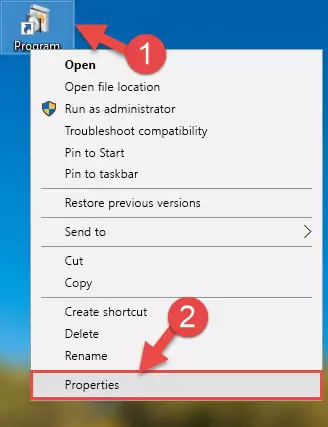
Step 1:Opening the program's shortcut properties window - Open the program installation directory by clicking the Open File Location button in the "Properties" window that comes up.
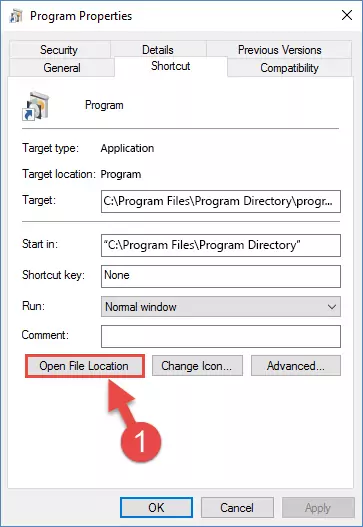
Step 2:Finding the program's installation directory - Copy the Filterfade.dll library into the directory we opened up.
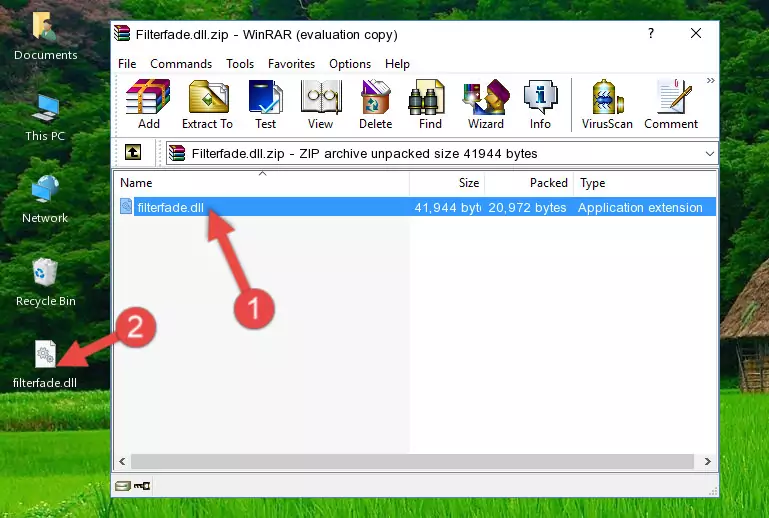
Step 3:Copying the Filterfade.dll library into the program's installation directory - That's all there is to the installation process. Run the program giving the dll error again. If the dll error is still continuing, completing the 3rd Method may help fix your issue.
Method 3: Doing a Clean Install of the program That Is Giving the Filterfade.dll Error
- Push the "Windows" + "R" keys at the same time to open the Run window. Type the command below into the Run window that opens up and hit Enter. This process will open the "Programs and Features" window.
appwiz.cpl
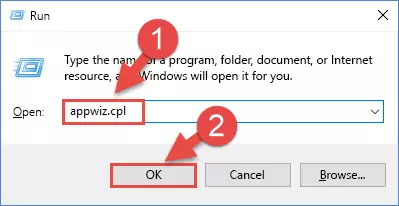
Step 1:Opening the Programs and Features window using the appwiz.cpl command - The programs listed in the Programs and Features window that opens up are the programs installed on your computer. Find the program that gives you the dll error and run the "Right-Click > Uninstall" command on this program.
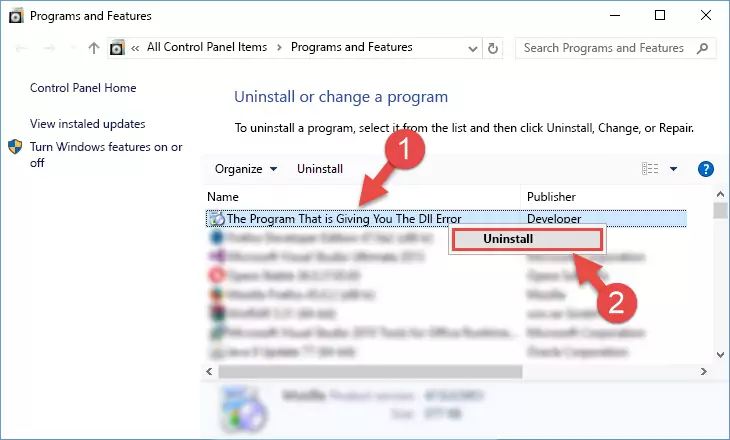
Step 2:Uninstalling the program from your computer - Following the instructions that come up, uninstall the program from your computer and restart your computer.
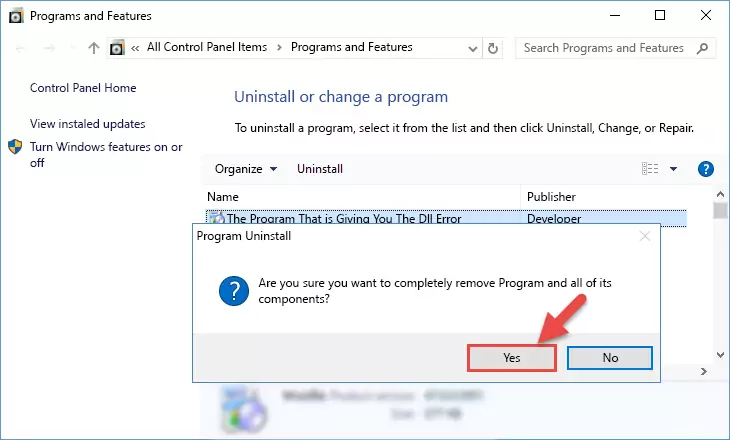
Step 3:Following the verification and instructions for the program uninstall process - After restarting your computer, reinstall the program.
- This method may provide the solution to the dll error you're experiencing. If the dll error is continuing, the problem is most likely deriving from the Windows operating system. In order to fix dll errors deriving from the Windows operating system, complete the 4th Method and the 5th Method.
Method 4: Fixing the Filterfade.dll Error Using the Windows System File Checker
- First, we must run the Windows Command Prompt as an administrator.
NOTE! We ran the Command Prompt on Windows 10. If you are using Windows 8.1, Windows 8, Windows 7, Windows Vista or Windows XP, you can use the same methods to run the Command Prompt as an administrator.
- Open the Start Menu and type in "cmd", but don't press Enter. Doing this, you will have run a search of your computer through the Start Menu. In other words, typing in "cmd" we did a search for the Command Prompt.
- When you see the "Command Prompt" option among the search results, push the "CTRL" + "SHIFT" + "ENTER " keys on your keyboard.
- A verification window will pop up asking, "Do you want to run the Command Prompt as with administrative permission?" Approve this action by saying, "Yes".

sfc /scannow
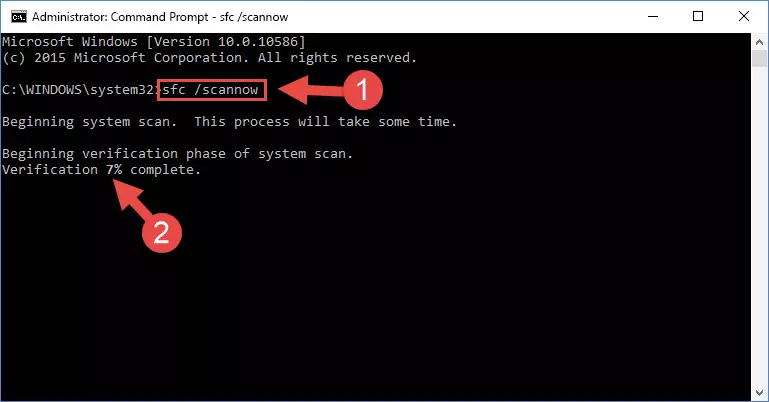
Method 5: Fixing the Filterfade.dll Error by Updating Windows
Some programs require updated dynamic link libraries from the operating system. If your operating system is not updated, this requirement is not met and you will receive dll errors. Because of this, updating your operating system may solve the dll errors you are experiencing.
Most of the time, operating systems are automatically updated. However, in some situations, the automatic updates may not work. For situations like this, you may need to check for updates manually.
For every Windows version, the process of manually checking for updates is different. Because of this, we prepared a special guide for each Windows version. You can get our guides to manually check for updates based on the Windows version you use through the links below.
Guides to Manually Update the Windows Operating System
Common Filterfade.dll Errors
The Filterfade.dll library being damaged or for any reason being deleted can cause programs or Windows system tools (Windows Media Player, Paint, etc.) that use this library to produce an error. Below you can find a list of errors that can be received when the Filterfade.dll library is missing.
If you have come across one of these errors, you can download the Filterfade.dll library by clicking on the "Download" button on the top-left of this page. We explained to you how to use the library you'll download in the above sections of this writing. You can see the suggestions we gave on how to solve your problem by scrolling up on the page.
- "Filterfade.dll not found." error
- "The file Filterfade.dll is missing." error
- "Filterfade.dll access violation." error
- "Cannot register Filterfade.dll." error
- "Cannot find Filterfade.dll." error
- "This application failed to start because Filterfade.dll was not found. Re-installing the application may fix this problem." error
